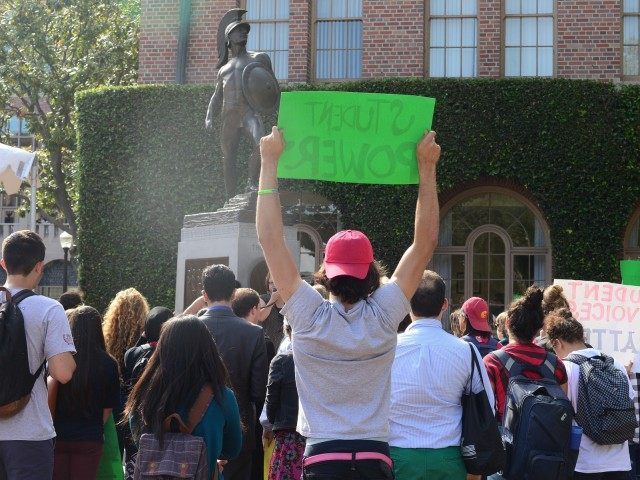The University of Southern California (USC) on Tuesday dropped several “intrusive” and invasive personal questions, which asked students about their sexual activity, from a mandatory online course.
The course is an extension of a federal mandate requiring schools to teach incoming students about sexual assault and “affirmative consent.”
The story first made national headlines after it appeared in Campus Reform, when the invasive nature of the questions was exposed by USC senior and pre-law student Jacob Ellenhorn. One of the questions asked, “How many times have you had sex (including oral) in the last three months?”
The students were then asked a follow-up question. “If you had sex (including oral) in the last 3 months, how many times had you used a condom?”
In response to the ensuing backlash, USC Senior Vice President for Administration Todd Dickey issued a statement indicating that the “inappropriate” questions would be removed from it’s Title IX education training module, which was created by CampusClarity.com and provides the material to almost 200 schools:
USC apologizes for any offense or discomfort caused by optional questions included as part of a mandatory on-line training for students on sexual consent, misconduct and other important issues.
These questions have been removed from our online-training module.
All colleges and universities are required by law to provide such training, and our training was a standardized module being used by hundreds of colleges and universities across the country.
An article published in USC’s school newspaper, the Daily Trojan, blasted the criticism over the personal sexual history questions, suggesting “the university’s apology in response to complaints is troubling.”
Nothing speaks more toward the desperation of the right wing to slow the progress of sexual assault reform than a complaint against sexual assault prevention training. But when the University was forced to issue an apology to students in response to a complaint that the training “was just full of super personal questions,” it was a troubling indication of pushback against sexual assault prevention education at a time when it is especially crucial, given the pervasiveness and gravity of sexual assault on college campuses — including ours.
Ellenhorn had a radio interview Dr. Drew Pinsky on Tuesday to discuss the way sexual assault education on college campuses has become pervasive. “It’s none of the university’s business about any of that stuff and I’m not sure what any of those questions have to do with educating anyone on sexual assault.”
Dr. Drew added that under America’s HIPAA Act, this sort of medical history is protected and that students are in no way obligated to reveal this private information. Furthermore, there was concern about security and the possibility that this information could be leaked if some outside entity were to hack the system.
Title IX applies to all universities that receive public funding from the government. The U.S. Department of Education has listed some obligations of universities on their site:
Some key issue areas in which recipients have Title IX obligations are: recruitment, admissions, and counseling; financial assistance; athletics; sex-based harassment; treatment of pregnant and parenting students; discipline; single-sex education; and employment. Also, a recipient may not retaliate against any person for opposing an unlawful educational practice or policy, or made charges, testified or participated in any complaint action under Title IX. For a recipient to retaliate in any way is considered a violation of Title IX.
Ellenhorn said another problem on campuses is that students are presumed guilty before being declared guilty or innocent.
“Students are getting sick and tired of this stuff. You’ve seen the media pushing this narrative.” Ellenhorn said that students in Greek life in particular had been blamed, unfairly, for perpetuating a “rape culture” on campus. “That’s not to say that sexual assault is not an issue. It’s a major issue and it needs to be taken care of.” He suggested that colleges should not handle sexual assault cases but that victims should instead contact the police and use the criminal justice system. Many universities, he said, attempt to hide sexual assault incidents in order to prevent blemishing their school’s image.
Dr. Drew added that “alcohol is a causational element in all of this,” noting that the issue has not been widely addressed yet. “Alcohol creates these environments where the line between yes and no gets blurred and students get themselves into these messy situations,” Ellenhorn concurred.
“Maybe you shouldn’t be drinking alcohol if you’re underage,” Ellenhorn added.
Follow Adelle Nazarian on Twitter @AdelleNaz and on Facebook.

COMMENTS
Please let us know if you're having issues with commenting.